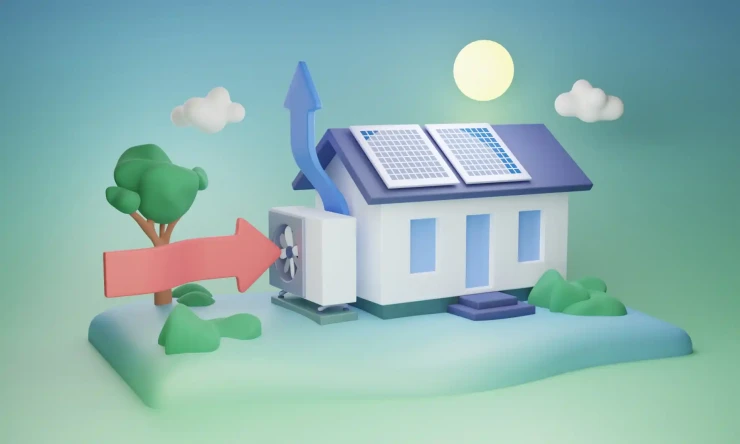The UK is committed to reaching net zero greenhouse gas emissions by 2050 and this means that we need to make fundamental changes to the way we currently live and work.
We are all familiar with dirty, fume-filled, and noisy construction sites. Construction sites have long depended on the internal combustion engine, but this is slowly changing as a clean, quiet revolution in ‘smart’ solar power is set to expel off-grid diesel from rail, highways, and construction projects in the next few years.
Temporary power is a necessity in many construction environments. Sites may need power for lighting, a site cabin or to operate tools or machinery. Running temporary power with a generator alone can be costly and also create an unwanted carbon footprint. A more cost-effective and environmentally sound approach is to use hybrid power solutions, using generator power only when needed and focusing on silent battery power with renewables attached where possible.
There is a lot of pressure on construction firms to reduce their environmental impact with concerns growing over climate change. They are also big users of finite natural resources.
COMPARE PRICES FROM LOCAL INSTALLERS
Compare prices from local companies fast & free
Enter your postcode to compare quotes from leading professionals. We promise to keep your information Safe & Secure. Privacy Policy
The UK is not alone in its drive to accelerate the reduction of carbon emissions to achieve significant milestones. The construction industry in North America is increasingly turning to the use of mobile and portable solar power generation and storage technologies to this end.
The built environment currently accounts for around 33% of the UK’s carbon emissions. However, the UK Green Building Council’s (UKGBC) new framework has recognised, that there are two elements to consider when reducing carbon emissions in construction. Although it’s essential to create energy efficient buildings it’s just as important for businesses to consider how to reduce their impact on the environment during the construction of these buildings. They should be measuring and reporting site energy usage and be taking steps to minimise it wherever possible, effectively making sites more energy efficient.
Here are some examples of how using solar power can be used to reduce energy consumption:
- It is not unusual for construction sites to need their own power supply. When it comes to off-grid energy sources, solar power is by far the most common and widely available choice. Solar power makes it possible to generate sufficient electricity at a building site without having to rely on noisy diesel engines. In addition to this, it would supply constant electricity throughout the day and night. Off-grid power systems offer several advantages for construction sites including low maintenance and financial savings over the course of the project's lifetime.
- Solar mobile power units can supply electricity to both light- and heavy-duty tools used on a building site. Some construction sites are complex while others may only require a mobile phone and tool charging station powered by one solar panel. Solar mobile power units can be utilised for the generation of electricity on larger sites, as well as a backup emergency power source.
- On larger building sites solar roof panels can be fitted early in the project’s development to generate power for cabins and general site use.
- Heaters are essential to the operation of many parts of the construction industry. Both passive and active solar heating systems can be utilised to keep construction sites at a comfortable temperature. During the winter months, the passive solar system is able to effectively collect, store, and transfer solar heat. Active solar systems also have devices that convert the sun's energy into a more usable form, such as hot water or electricity.
- It is essential that a construction site be equipped with appropriate solar LED lights for construction work to continue in an efficient and risk-free manner during times when there is insufficient natural light. Solar LED lights are inexpensive and simple to set up. In addition, because the sun is the source of energy for these eco-friendly lights, money is saved on electric bills and batteries. These lights can be used in any temporary offices that are set up on the construction site.
- It is absolutely necessary to have an adequate ventilation system in place at building sites in order to ensure that dust and other pollutants are removed. Solar ventilation devices, like solar attic fans, make use of the sun's energy to remove stale, stifling air from construction sites and replace it with cool, outside air.
- One of the most economical uses of solar energy is for water heating. Heaters are essential to the operation of many parts of the construction industry. Both passive and active solar heating systems can be used to keep construction sites at a comfortable temperature.
Back in 2019, award winning innovation was led by UK independent manufacturer, Prolectric since developing solar alternatives to diesel tower lights. These diesel tower lights had already saved an estimated 1 million litres of diesel, 3,000 tonnes of CO2, and £800,000 of fuel costs. Corresponding reductions of NOx and PM emissions are helping contractors to reduce air pollution from Non-Road Mobile Machinery (NRMM) in busy urban locations, particularly London which operates its own strict NRMM Low Emissions Zone.
Prolectric also added the UK’s first autonomous solar-powered off-grid generator to its portfolio in 2019. The wedge-shaped device was modelled on a standard 20ft shipping container, with an array of PV solar panels mounted along its diagonal face, harvesting sunshine to charge on-board batteries. Each device delivers up to 25kW of dependable, on-demand off-grid power use for site compounds, such as heating and lighting for site offices and welfare cabins, as well as for everything from water coolers to power tools and CCTV cameras. They’ve now developed the technology further providing better intelligent control and a more efficient solution.
The ability to right-size the power demands and output using solar power has made the construction manager’s job of delivering carbon reductions on sites easier. It has opened up many more use cases from charging battery-powered tools, to powering security and communication systems, and to offset diesel power generation traditionally used to power admin and cabins.
The return on investment for solar power generation versus diesel generators finally makes more sense today which should empower construction companies to move more rapidly towards embracing change and a cleaner future for the industry.
Contractors are primarily cost-driven so businesses offering low-carbon technologies for construction sites must also make them commercially viable.
Having said that, each standard solar tower light for example, will save up to 6 tonnes CO2 per annum. The scalability of these technologies has a huge potential to contribute to a zero-carbon future, as well as tackling air pollution.
Switching to using renewable energy sources on construction sites is not only environmentally friendly but it’s also low maintenance and a good way to reduce energy expenses.
Another way to reduce carbon emissions on a construction site is to source materials needed locally to limit transportation emissions.
It’s also important to cut down on waste. There can be huge wastage on a construction site. Excess materials at the end of a project should be shared with other organisations that can use them and everything that can be recycled should be placed in different skips or bins.
Businesses should set sustainability targets and regularly measure their performance against them. This is a great way of motivating staff to follow green initiatives and boost the company’s reputation as a responsible organisation.
Some projects will have multiple suppliers which makes it even more difficult to keep site emissions to a minimum. Suppliers should be sought that also prioritise sustainable practices particularly those who go above and beyond the basic environmental policy to include policies and targets for things such as waste reduction, transport planning and raw material reduction.
It's becoming more and more important for businesses to demonstrate corporate social responsibility. It often results in positive PR and can influence buyer behaviour. Certainly, if prices are similar between 2 businesses it is likely that consumers will switch to the company that is associated with a good cause.
As greater sustainability expectations are set by planners and the building regulations, the minimum bar is rising for everyone involved in the construction industry. An increasing number of construction projects will need to incorporate demonstrable sustainable approaches to meet client expectations in the future.





























